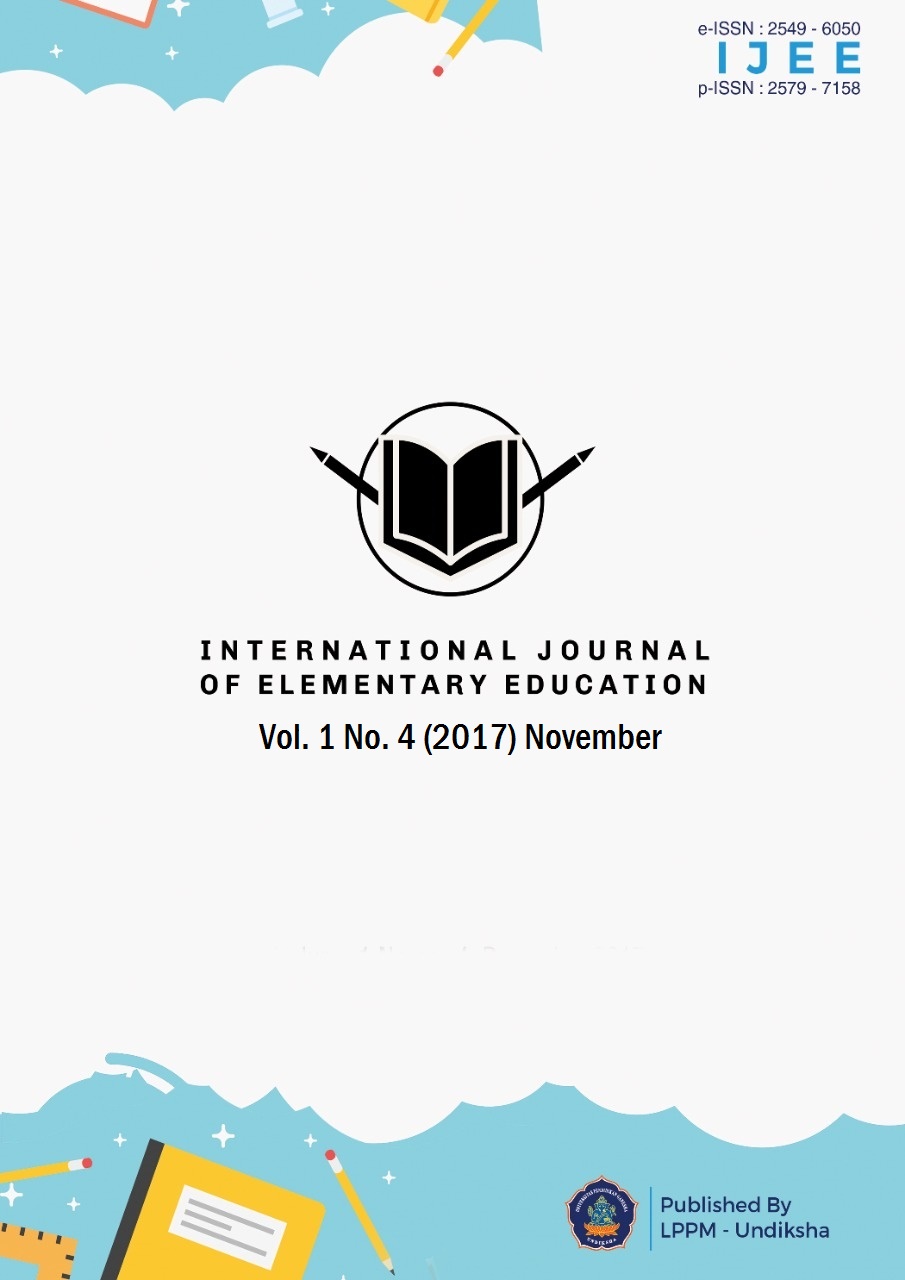PENGARUH MODEL PEMBELAJARAN KOOPERATIF TIPE TEAMS GAMES TOURNAMENT (TGT) TERHADAP MOTIVASI BELAJAR IPA DI KELAS IV SDN KELAPA DUA 06 PAGI JAKARTA BARAT
DOI:
https://doi.org/10.23887/ijee.v1i4.12966Abstract
This study aims to determine the effect of implementation of cooperative learning model type teams games tournament (TGT) in science learning to motivation to learn fourth grade students of SDN Kelapa Dua 06 Pagi West Jakarta. The population in this research amounting to 52 people. The sample of this research consists of two groups, namely the experimental group of 26 people and the trial group of 27 people. Sampling is determined by purposive sampling technique. The results showed that: (1) the observation result during the study showed that the percentage of student activity increased by 66.67% to 93%; (2) t-test results obtained p-value of 0.02 (p <0.05) and tcount> ttable ie 2.42> 2.05 which means reject H0. This shows that there is a positive influence of cooperative learning model of type teams games tournament (TGT) on the motivation to learn science of grade 4 students of SDN Kelapa Dua 06 Pagi Jakarta in the academic year 2016-2017References
Desmita. (2016), Psikologi Perkembangan Peserta Didik, PT. Remaja Rosdakarya, Bandung.
Hamdayama, Jumanta. (2016), Metodologi Pengajaran, PT. Bumi Aksara, Jakarta.
Imamah, N. (2012), “Peningkatan Hasil Belajar IPA melalui Pembelajaran Kooperatif Berbasis Konstruktivisme Dipadukan Dengan Video Animasi Materi Sistem Kehidupan Tumbuhan”, .Jurnal Pendidikan IPA Indonesia, Volume 1, No. 1, 32-36.
Priansa, Doni Juni. (2014), Kinerja dan Profesionalisme Guru, CV. Alfabeta, Bandung.
Putri, Yupinda Prima. (2016). Pengaruh Model Pembelajaran Kooperatif tipe Teams Games Tournament (TGT) terhadap Motivasi Belajar IPS Siswa Kelas VIII MTs Negeri 1 Tulang Bawang Tahun Ajaran 2015/2016.Skripsi di akses dari http://digilib.unila.ac.id/24801/.
Samatowa, Usman. (2016), Pembelajaran IPA di Sekolah Dasar, PT Indeks, Jakarta.
Slavin, Robert. E. (2016), Cooperative Learning: Teori, Riset dan Praktik. (Terjemahan Narulita Yusron), Nusa Media, Bandung. (Buku asli diterbitkan tahun 2005).
Sugiyono. (2013), Metode Penelitian Kuantitatif Kualitatif dan R&D, Alfabeta, Bandung.
Suprihatin, Siti. (2015), Upaya Guru dalam Meningkatkan Motivasi Belajar Siswa, Jurnal Pendidikan Ekonomi UM Metro, Volume. 3, No.1, 73-82.
Surna, I. N. & Pandeirot, O.D. (2014), Psikologi Pendidikan 1, Erlangga.
Syukur, Imam Abdul, dkk. (2014), Pengaruh model pembelajaran teams games tournament termodifikasi berbasis outbound terhadap prestasi belajar fisika ditinjau dari motivasi belajar, Jurnal Pendidikan dan Kebudayaan, Volume. 20, No. 3, 310-327.
Uno, Hamzah B. (2008), Teori Motivasi dan Pengukurannya, PT Bumi Aksara, Jakarta.
Wisudawati, A.W. & Sulistyowati, Eka. (2014), Metodologi Pembelajaran IPA, Bumi Aksara, Jakarta.
Zahroh, Aminatul. (2015), Membangun Kualitas Pembelajaran Melalui Dimensi Profesionalisme Guru. Yrama Widya, Bandung.
Downloads
Published
How to Cite
Issue
Section
License
Authors who publish with the International Journal of Elementary Education agree to the following terms:
- Authors retain copyright and grant the journal the right of first publication with the work simultaneously licensed under a Creative Commons Attribution License (CC BY-SA 4.0) that allows others to share the work with an acknowledgment of the work's authorship and initial publication in this journal.
- Authors are able to enter into separate, additional contractual arrangements for the non-exclusive distribution of the journal's published version of the work (e.g., post it to an institutional repository or publish it in a book), with an acknowledgment of its initial publication in this journal.
- Authors are permitted and encouraged to post their work online (e.g., in institutional repositories or on their website) prior to and during the submission process, as it can lead to productive exchanges, as well as earlier and greater citation of published work. (See The Effect of Open Access)









